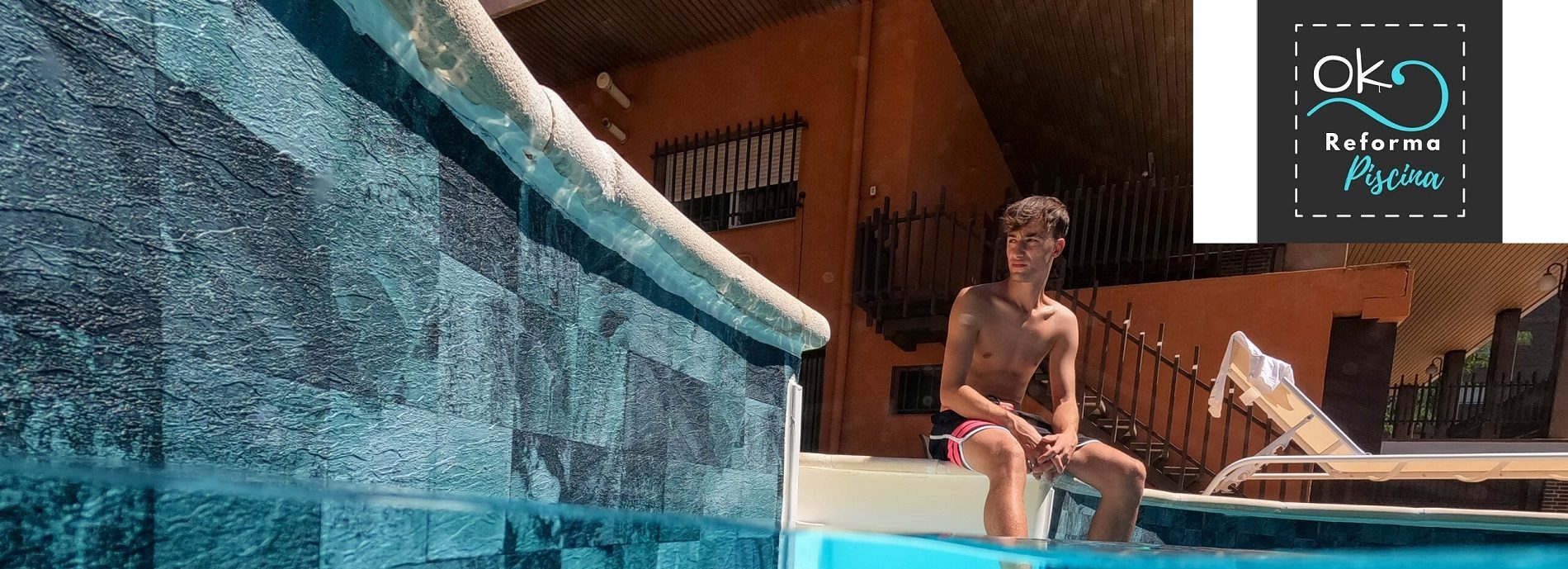
Table of contents of the page
En Ok Pool Reform within Chemical products We present the article about: What type of chlorine to use for swimming pools: which chlorine is better?
What is pool chlorine?
What chlorine is best for swimming pools?

Best type of chlorine to use in the pool
Certainly, there is no valid verdict to answer what type of chlorine is best to consume.
What the right chlorine pool disinfectant depends on
The appropriate chlorine disinfectant for swimming pools will depend on several factors: characteristics, condition of the pool, cost, location, location of the pool, storage capacity...
So, below, we will tell you the comparison between the different chlorines so that you can choose wisely.
Warnings about pool chlorine
Safety About Using Pool Chlorine
- Pool chlorine in contact with acids releases toxic gases.
- Very toxic to aquatic organisms, with long-lasting harmful effects.
- Harmful if swallowed.
- Causes serious eye irritation.
- It can irritate the respiratory tract.
- Use biocides in a safe way. Always read the label and information about the biocide before using it.
- Attention! Do not use together with other products. May release dangerous gases (chlorine).
What type of chlorine to use for swimming pools?
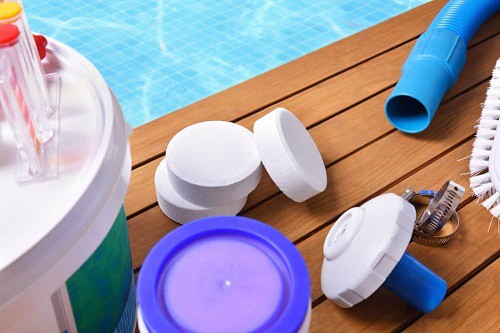
Comparative table of the most used type of chlorine for swimming pools
Next, we show you a comparative table with the different types of chlorine, or chlorine compounds most used in pool water sanitation.
| Number of Types of chlorine for swimming pools | Stabilized or not (contains or does not contain CYA = isocyanuric acid) | Chemical composition of types of chlorine for swimming pools | Chlorine volume in the Types of chlorine for swimming pools | Effect of Types of Pool Chlorine on pH: | Appropriate treatments of chlorine types for swimming pools | Description of use of types of chlorine for swimming pools |
|---|---|---|---|---|---|---|
| SLOW CHLORINE POOL OOther names for slow pool chlorine: *Also know as pool trciloro. | Slow Pool Chlorine is Stabilized Stabilizer content (isocyanuric acid): 55% | | Available chlorine by volume in the pool trichloro: The active ingredient, trichloro-s-triazinetrione (trichloro), is up to 90% chlorine | Effect on pH of slow chlorine: the product has a very acidic pH: 2.8-3.0; so the pH of the pool water will decrease. | Indicated use of Tirchlor pool: Pool water maintenance treatment | Slow pool chlorine is used throughout the swimming season as a maintenance disinfectant, because the release of the active ingredient is slower and gradual. |
SHOCK CHLORINE OOther names for pool shock chlorine: *Also known as dichloro pool, fast chlorine or shock chlorine, sodium cycloroisocyanurate and dichloro-S-triazinetrione. | Chlorine is quickly stabilized Stabilizer content (isocyanuric acid): 50-60%. | . | Available chlorine by volume: 56-65% | Effect on the pH of shock chlorine: Product with neutral pH: 6.8-7.0, so it has no effect on the pH of the pool water, nor does it raise or lower the pH. | Indicated use Dichloro pool: SHOCK treatment of pool water | Shock Chlorine Used for pool starter treatment Likewise, It is used for rebellious cases as green waters or lack of chlorination- |
| CALCIUM HYPOCHLORITE OOther names for Calcium Hypochlorite: *Also know as (Cal Hypo) Chlorine tablets or granulated chlorine | Stabilizer content (isocyanuric acid): IT DOES NOT HAVE. Prevents overstabilization of the pool with cyanuric acid. | | Available chlorine by volume: Generally Calcium hypochlorite is sold with a purity of 65% to 75% chlorine concentration, mixed with other chemicals present, such as calcium chloride and calcium carbonate, resulting from the manufacturing process | Effect on pH: The pH of this type of product is very high, that is, strongly alkaline: 11.8 – 12.0 (it will require exhaustive control in case we need to lower the pH of the pool water ) | Intended use Pool Calcium Hypochlorite: SHOCK treatment of pool water | Calcium hypochlorite acts as an effective and immediate shock treatment disinfectant agent; eliminate impurities from water with fungicide, bactericide and microbicide action. Yes |
| LIQUID CHLORINE POOL *Also known as sodium hypochlorite or bleach *This is the chlorine produced by salt chlorinators | Not stabilized Stabilizer content (isocyanuric acid): IT DOES NOT HAVE. Prevents overstabilization of the pool with cyanuric acid. | | Available chlorine by volume: It is made from a sodium hypochlorite solution, so the available chlorine by volume is about 10-12 | Effect on pH: The product has a very high pH, extremely alkaline; so the pH of our pool water will increase. | Indicated use Liquid chlorine: Pool water maintenance treatment | Sodium hypochlorite is a product that is especially indicated for the maintenance of pool water, since it is a disinfectant, biocide and bactericidal product. From another perspective, it also solves the problem of green or cloudy waters in a short time. Additionally, it can be used to shock the pool at the end of the season. At the same time, liquid chlorine is also very appropriate to combat legionella. |
What chlorine to use for removable pool

What chlorine to add to a removable pool
Because a removable pool we empty it every year, an ideal option is multi-action chlorine.
The reason is because it has multiple effects including algaecide, flocculant and even anti-limescale and PH maintainer, so its use greatly facilitates the biochemical maintenance tasks of our pool.
Do not combine the use of different types of chlorine
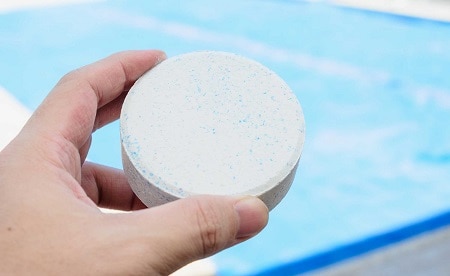
Not all pool chlorines are compatible with each other.
- Firstly, emphasize that mixing different types of chlorine can be extremely volatile and even lethal.
- Secondly, choose a bleach and stick with it.
- If you decide to switch to a different form of chlorine, do your research and get rid of any leftover containers of the previous chlorine, i.e. Never store two different types of bleach near each other.
- Elemental chlorine is a halogen gas and is an extremely strong and volatile oxidant, so for safety reasons, Chlorine gas is generally prohibited, therefore we must use more stable forms of chlorine with other elements.
Stabilized pool chlorine type analysis
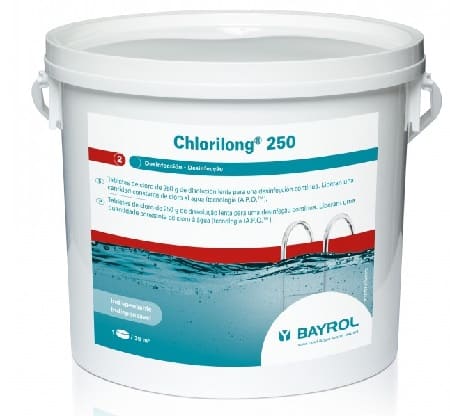
What is stabilized pool chlorine type?
Type Stabilized pool chlorine = chlorine together with isocyanutic acid (CYA)
Stabilized chlorine is the collective name assigned to chlorine when a pool stabilizer has been added, or specifically, cyanuric acid, or its chlorinated compounds such as Sodium Dichloroisocyanurate and Trichloroisocyanuric Acid.
Cyanuric acid pool what is it
What is cyanuric acid in swimming pools?: Chlorinated isocyanurics are a weak acid stabilized chlorine compound (C3H3N3O3), with limited solubility in water (chemical additive) that is incorporated to stabilize chlorine in water. Furthermore, although it is essential for the maintenance of the pool, it is actually little known among owners of private pools and is even rarely mentioned in pool specialist stores despite its vital importance.
Cyanuric acid in the pool protects chlorine from the sun's ultraviolet rays
Keep in mind that the cyanuric acid in the pool It protects chlorine from the sun's ultraviolet rays, a factor that helps chlorine remain in the pool for longer, and therefore reduces the need for chlorine.
How does stabilized chlorine act chemically?
When CYA is combined with chlorine, it becomes bound to it
When CYA (isocyanuric acid) is mixed with pool water, most of the chlorine remains bound to it.
Under these conditions of chemical equilibrium, a high percentage (> 95%) of free chlorine is bound and inactive and has no disinfectant capacity, it is only a reserve with disinfection potential.
Only hypochlorous acid HOCl or active chlorine acts as an oxidant and disinfectant. The problem is that the concentration of HOCl, in addition to being very small, is very dependent on the concentration of CYA, with HOCl decreasing when CYA increases.
To conclude, if you want to complement the information, we leave you the link to the article: What is cyanuric acid swimming pool?
Most pool owners choose to treat their pool with stabilized pool chlorine.

Truly, People who enjoy a private pool collectively manage the purification of the pool water with stabilized chlorine, since simply treating the pool is more basic.
Stabilized chlorine benefits
- Fundamentally, Stabilized chlorine reduces the amount of chlorine required.
- That way, you get economize the practice of chlorine, turning it into substantial savings.
- And hence, pool water maintenance It will be less laborious and will be carried out in a shorter period of time.
Disadvantages of stabilized types of chlorine for pools
Likewise, an element to highlight is that The greater the density of the pool CYA in the water, the more considerably the water will be saturated.
Consequently, the disinfection effectiveness of chlorine will decrease.Therefore, you will either have to dilute the water or depending on its condition you will even have to empty it all.
Types of stabilized chlorine for swimming pools
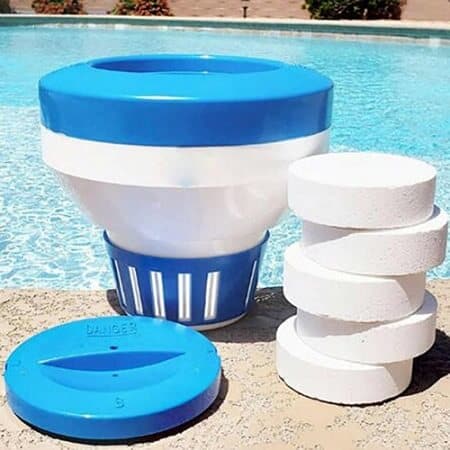
1st Types of chlorine for Stabilized pools
Shock chlorine

Names given to shock chlorine
Shock chlorine can be given the following names: fast chlorine, dichloro pool, sodium dichloroisocyanurate and dichloro-S-triazinetrione.
What is pool dichloro for? quick chlorine or shock chlorine
When to perform a pool shock treatment
Firstly, mention thatPool dichloro is also known as rapid or shock chlorine, Quick chlorine is used for pool starter treatment and for stubborn cases as green waters or lack of chlorination; That is, what is sought is to achieve the optimal chlorine level in a short time.
Situations in which to perform a pool shock treatment
- Commonly used to superchlorinate water when the presence of chloramines (also known as combined chlorine) is detected. The product is available in granular or powder form.
- Kill algae, bacteria or other harmful pathogens
- If there has been a major storm, or any other cause that may require immediate disinfection.
- At the beginning of the swimming season if you have had the pool overwintered.
- etc.
Chemical composition of pool shock treatment
- First of all, the fast chlorine type byproducts in the pool water: sodium cyanurate (NaH2C3N3O3) + hypochlorous acid (2HOCl)
- Available chlorine by volume: 56-65%
- In addition, it contains a stabilizer (Isocyanuric Acid) that slows down the evaporation of the product in the sun's rays: approximately 50-60% is isocyanuric acid.
- pH: 6.8-7.0 (neutral) which means only a small amount of pH increaser.
Advantages of shock chlorine
Quick chlorine disinfection efficiency immediately
Rapid chlorine is the solution for rapid and intense disinfection of pool water in a short time so that it dissolves in the water almost instantly thanks to its active ingredient.
Disadvantages of fast chlorine
Cons shock chlorine
- a small amount of pH increaser with the use of dichlor
- .this type slightly reduces the total alkalinity of your pool water.
- Dichlorine is a fire hazard and is not easily introduced through an automatic feeding system due to its fast-dissolving nature.
Buy shock chlorine
granulated rapid chlorine
Chlorine Shock Treatment 5kg
[amazon box= «B0046BI4DY» button_text=»Buy» ]
Dichlorine granules 55%
Shock granulated chlorine for fast action 5 kg
Gre 76004 – Granulated shock chlorine, shock action, 5 kg
2st Types of chlorine for Stabilized pools
Slow chlorine pool
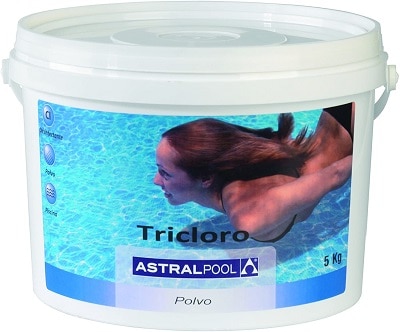
Names given to slow pool chlorine
Slow pool chlorine can be given the following names: trichloro, chlorine tablets, trichloro-s-triazinetrione and trichloroisocyanuric acid.
When to use slow types of chlorine for swimming pools
Slow bleach is a year-round maintenance disinfectant
Slow chlorine or trichlor is used to maintain pool water. because the release of the active ingredient is slower. This allows better control of chlorine levels in the dosage, thus allowing better and greater effectiveness for long periods.
Slow chlorine is a popular disinfectant for private and residential pools
De This way, trichlor is affordable and slow-dissolving, making it an extremely common form of chlorine disinfectant for private pools and residential pools year-round.
Pool trichloro chemical composition
- Firstly, the tricloo byproducts pool into the water: cyanuric acid (H3C3N3O3) + hypochlorous acid (3HOCl)
- The active ingredient, trichloro-s-triazinetrione (trichloro), is up to 90% chlorine, which makes this form of sanitation highly efficient.
- However, a 55% of the trichloro pool represents isocyanuric acid.
- To conclude, trichlor has a Low pH, usually around 3.
How triple action pills work
Slow pool chlorine is a mixture of additives that has a triple action
Granulated trichloro tablets for swimming pools incorporate algaecides and a decanter (flocculant), so they contain 90% active chlorine in the form of trichloroisocyanuric acid, boric acid or copper sulfate as an algaecide and alumina sulfate as a decanter.
Consideration when using slow chlorine tablets
- The most important consideration when using these chlorine tablets is to make sure they are dispersed as evenly as possible.
- Of course, it is not advisable to simply throw them into the pool. If possible, place the slow chlorine tablets in the skimmer basket or else in a chemical product dispenser float.
- Instead, it is recommended to use an automatic chlorinator.
Advantages of using triple action chlorine tablets
This mixture of additives allows it to exert a triple action, preventing the development of pathogenic microorganisms, algae growth and flocculation of suspended particles.
It dissolves slowly, so the release of the components is done gradually.
Finally, we can affirm that trichlor pool tablets are profitable in terms of time and money because they are relatively inexpensive and can be dispersed passively.
Disadvantages of using slow types of chlorine for swimming pools
- It should be noted that Trichlorine is volatile and explosive when encountered with hypocalcium.
- They should also not be thrown to the bottom of the pools as they burn the paint or in liner pools they leave white stains.
- Trichlorine has a low pH, generally around 3, which means that it is very acidic, so it is possible that when using it, the pH of the pool will lower (specific page: how to increase pool pH).
- According to what has already been explained, as a 55% of the pool trichloro is composed of isocyanuric acid, consequently, on the one hand it is introducing stabilizer (isocyanuric acid) with the chlorine, so it survives the sun for longer but as a counterpart We saturate the water in the pool.
- Therefore, trichlor is also very acidic, which can corrode metal components within the pool system, especially if the pump does not circulate the water properly. (How does the pool filtration system work?).
Safety precautions when using triple action pool chlorine type
Be careful with the use of slow pool chlorine = oxidizing product
The use triple pool chlorine type Action also requires caution, even more so considering that it is an oxidizing pool chemical.
Possible slow chlorine impacts on human health
To the effect that incidents have occurred in people's health such as: skin irritation and discoloration, abdominal pain, burning sensation eye irritation, cough, sore throat and difficulty breathing, ulcers and nasal symptoms prolonged skin contact can cause dermatitis; among other less frequent symptoms.
Buy trichlor chlorine
slow chlorine pills
Slow Chlorine Tablet 5 Kg (20 x 250 gr)
Chlorine Tablets 200 Grs 5 Kg
Chlorine tablets
slow granulated chlorine
5 Kg Trichlorine Granules
Quimicamp granulated slow chlorine
Chlorine Grain, Slow Dissolution for Swimming Pools, 5 Kilos.
3st Types of chlorine for Stabilized pools
Chlorine 5 shares

What are the 5 actions tablets for swimming pools used for?
Ideal for complete maintenance of pool water, in addition to obtaining an economical product by encompassing different products in one.
What are the 5 actions of chlorine?
What are the 5 actions of chlorine? : Anti-algae, flocculant, stabilizer, disinfectant and anti-limescale.
Advantages of 5-action chlorine tablets
Innovative formula it is possible to eliminate bacteria, viruses and microorganisms with a single application. In addition, it prevents the development of algae, keeping the water transparent and crystalline.
The chemical components of these product ranges are various: slow chlorine, shock chlorine, anti-algae, anti-limescale and flocculant. A single dose of this product allows you to treat the pool in depth and have crystal clear water.
These five actions are disinfectant, algaecide, clarifying, pH regulator and anti-limescale.
Disadvantage of 5-action pool pills: WE DO NOT RECOMMEND IT
The pproduct contains a LOT of isocyanuric acid which collapses the dichlorine protector pool and causes the water to become saturated and not accept any additional addition of chlorine.
Analysis Types of chlorine for pools NOT Stabilized

What is unstabilized chlorine?
Unstabilized chlorine is chlorine to which cyanuric acid (a pool stabilizer) has not been added.
Chemically the cyanuric acid helps keep chlorine stabilized and active
Chemically, the cyanuric acid It helps keep chlorine stabilized and active and can therefore disinfect your pool water, even in strong sunlight.
But this does not mean that the chlorine will not decompose, but the stabilizer keeps it active in the pool water much longer than chlorine alone.
Choice of formats to add cyanuric acid
You can often buy premixed solutions that already have the right amount of pool stabilizer added to the chlorine or you can mix it yourself.
So, you can click on the link and learn all about the variety of different ways and tricks to increase cyanuric acid .
Sun exposure of pool water without stabilizer
Pool water without stabilizer, when exposed to the sun, loses approximately 35% of CL per hour.
When is it ideal to use unstabilized chlorine?
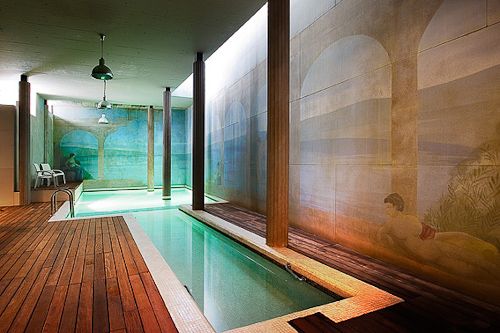
Unstabilized chlorine = ideal for indoor pools
Unstabilized chlorine is designed for indoor pools, which do not receive sunlight.
Covered pools, we will replace cyanuric acid with muriatic acid
If you have an indoor pool, the UV problem will not apply, so you will most likely use unstabilized chlorine as a means of keeping your pool clean and safe.
This does not mean that acid is not part of your chemical repertoire, but You will use what is called muriatic acid, which serves a similar function but is also very different.
Possible uses of unstabilized chlorine
List of possible uses of unstabilized chlorine
We insist, unstabilized chlorine is recommended for indoor pools.
Below, we detail the most common uses that you can give to unstabilized chlorine.
- To begin with, unstabilized chlorine is frequently used as long-term treatment without the use of stabilizers.
- Secondly, the pre-dosed stick model of unstabilized chlorine is used for a slow dissolution in pool disinfection.
- Unstabilized chlorine is good for a Quick daily chlorine recharge if your pool is receiving heavy use.
- On the other hand, unstabilized chlorine is also used in those cases where there is a high concentration of active chlorine.
- Likewise, it is ideally served for a end of season treatment.
- At the same time, it fulfills the function of complementary treatment during major heat waves and high temperatures.
- And finally, it is also frequented as pool shock absorber.
Considerations when using unstabilized chlorine

Attention when using unstabilized chlorine
- As a reminder, mention again that Since it does not contain a stabilizer, if it is exposed to the sun, it will not last long.
- All of this means that unstabilized chlorine dissipates much faster than stabilized pool chlorine, and tYou will need to add more chlorine more frequently.
- Consequently, we note that it is important to have a rigorous control of chlorine level to confirm that their values are above 3 parts per million (ppm).
- Obviously, if you do not have the correct chlorine value, you must add the necessary amount to your pool to reach the ideal chlorine value.
How to add unstabilized chlorine
Procedure for adding unstabilized chlorine
- Firstly, check the pH value and, if necessary, bring it into the ideal range of 7,0 to 7,4.
- In case of problems in the water, add 200 g of stabilized chlorine directly to the water per 10 m³ with the circulation pump running.
- The circulation pump runs for 12 hours.
- – Do not bathe again until the chlorine content has dropped below 3 mg/l.
- – For basic chlorination, add 50 g per 10 m³.
Different types of unstabilized chlorine
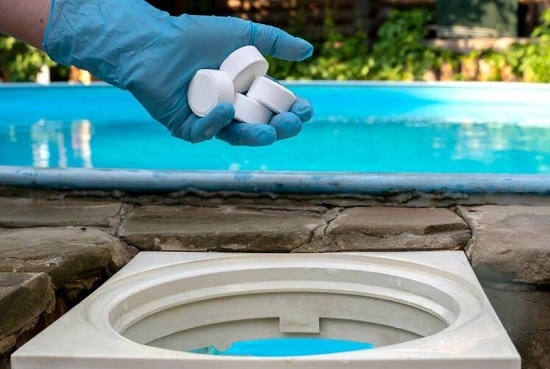
1st types of chlorine for pools NOT stabilized
Calcium hypochlorite

Names given to calcium hypochlorite chlorine
Calcium hypochlorite can be called by the following names: Cal-Hypo, chlorine tablets or granulated chlorine.
Most used powder pool maintenance disinfectant calcium hypochlorite
Properties as a disinfectant, fungicide, bactericide and microbicide agent
Calcium hypochlorite is the most popular disinfectant among private pool owners; and can be supplied in powder or tablet form.
Calcium hypochlorite characteristics
- To begin with, calcium hypochlorite is white, solid, and can be purchased in tablet or granular form.
- This product is easy to store and apply, and destroys a wide variety of pathogens, although due to its slow dissolution it can clog pool components, cloud the water, reduce pH and increase alkalinity.
- Generally Calcium hypochlorite is sold with a purity of 65% to 75% chlorine concentration, mixed with other chemicals present, such as calcium chloride and calcium carbonate, resulting from the manufacturing process.
- Byproducts in pool water: hypochlorous acid (HOCl) + calcium (Ca+) + hydroxide (OH-)
- Finally, the pH of this type of product is very high, that is, strongly alkaline: 11.8 – 12.0 (it will require exhaustive control in case we need to lower the pH of the pool water )
Advantages Calcium Hypochlorite
- Water and energy consumption can be reduced
- Minimizes the need for pH corrections
- Helps protect the plant from corrosion
- Does not increase cyanuric acid levels
- Improves water quality and bather comfort
- It is easier to achieve balanced water
- Helps control total dissolved solids
- Particularly for pools with plaster surfaces, hypo lime helps saturate the water with calcium to reduce the risk of etching.
Warning when using chlorine tablets or granules
Always wear gloves and protective equipment when handling tablet or granular chlorine, and keep it stored away. safe way.
It is a very strong oxidizer and a fire hazard, and when close to certain chemicals (other types of chlorine, for example), it can spontaneously burn. Never, and we repeat, never put any other type of chlorine in a lime hypofeeder.
Cons chlorine tablets or granules
- The main thing to keep in mind is that lime-hiccup will increase the calcium hardness levels in the water. If pool water remains too hard for too long, it can cause corrosion to the pool surface. Next, we leave you a page where we explain how to lower the hardness of water.
- Cal-hypo also has a high pH of approximately 12, therefore it will be necessary to monitor that the pH of the pool has not increased.
Buy Calcium Hypochlorite
calcium hypochlorite price
5 kg of calcium hypochlorite 65% in 7 g tablets for swimming pools
Granulated Calcium Hypochlorite with Approx. 70%
Granulated Calcium Hypochlorite
2nd types of non-stabilized chlorine for pools
Pool liquid chlorine

Names given to shock chlorine
Pool liquid chlorine can receive the following names: sodium hypochlorite and liquid bleach.
Main use liquid chlorine pool
El liquid chlorine or sodium hypochlorite, generally comes in a 10% concentration and is the most economical. It is the most unstable in its composition and loses effectiveness over time due to instability in the face of sunlight. It is usually used as shock chlorination.
- Chlorinated product especially indicated for the maintenance of swimming pool water
- Disinfectant, biocidal and bactericidal product
- It solves in a short time the problem of green or cloudy water.
- Thanks to its formulation it does not leave residues in the water, unlike other chlorinated products
- Indicated for treatments against legionella
Very common liquid disinfectant in swimming pools
Sodium hypochlorite, commonly known as liquid bleach or simply "bleach" by service technicians, is a liquid disinfectant that is very common among pool professionals and cost effective.
A household chemical widely used since the XNUMXth century as a disinfectant or bleach, in fact the oldest and still most important chlorine-based bleach.
Chemical components of liquid chlorine for swimming pools
- It is made from a sodium hypochlorite solution, so the available chlorine by volume is around 10-12%,
- but in fact, it is the least expensive form of chlorine disinfectant.
- Sbproducts in pool water: hypochlorous acid (HOCl) + sodium (Na+) + hydroxide (OH-)
- pH: 13,0 (extremely alkaline)
Pros liquid chlorine for pools
- It can be added in bulk, making it a great solution for larger commercial pools.
- Liquid chlorine is accessible and easy to measure.
- It is inexpensive.
- Liquid chlorine is also ideal for automated chemical feeders.
Disadvantages of liquid chlorine for swimming pools
Short shelf life pool liquid chlorine
The shelf life of liquid chlorine, depending on the circumstances, is not great.
It deteriorates in a matter of weeks, and in the presence of direct sunlight, it could be a matter of days or even hours.
That's why many pools use stabilizers like isocyanuric acid to give chlorine a longer shelf life in the water.
Ultimately, this deterioration of chlorine is accelerated in the presence of metals such as iron.
Cons liquid pool chlorine
- Fundamentally, sodium hypochlorite has a yellowish color and dissolves immediately, and although it is a very effective product, it is more corrosive and unstable than calcium hypochlorite, so its handling requires great caution.
- One drawback is that liquid bleach has a pH value of 13 or higher, therefore, when you pour the product into the pool water, in principle, you will have to lower the pH of the pool water.
- Another drawback is that liquid bleach can be very corrosive to pool surfaces. If used incorrectly, the long-term costs of using liquid bleach can far outweigh the short-term savings.
- This form of chlorine will also increase the water's total dissolved solids (TDS) due to its sodium chloride (salt) content, but does not have a negative impact on disinfection.
- Sodium hypochlorite is not stable and could eventually lose strength over time.
- It is recommended that the product be kept in a cool, dark place.
- Its corrosive properties, common availability, and reaction products make it a significant safety risk.
- Always remember to wear protective clothing when handling chemicals.
- Sodium hypochlorite is a liquid, so secondary containment is recommended.
- Finally, never mix acid and chlorine directly. The fumes are toxic. In particular, mixing liquid bleach with other cleaning products, such as acids or ammonia, can produce toxic fumes.
Buy liquid chlorine for swimming pools
sodium hypochlorite price
Liquid chlorine for pools Bayrol Chloriliquid 20 kg. 12% sodium hypochlorite
Hypochlorite for swimming pool
Liquid chlorine bottle 10L
Concentrated liquid chlorine, sodium hypochlorite. 5L bottle
3rd types of chlorine for pools NOT stabilized
lithium hypochlorite

Lithium hypo (lithium hypochlorite)
Lithium hypochlorite is not very common, mainly due to cost and low resistance.
Chemical components of lithium hypochlorite
- Byproducts in pool water: hypochlorous acid (HOCl) + lithium (Li+) + hydroxide (OH-)
- Available chlorine by volume: 28-35%
- pH: 10.8 (alkaline)
Pros lithium hypochlorite
- Lithium hypo dissolves quickly and can be introduced as a powder, or can be pre-dissolved in a bucket before introduced as a liquid; which reduces the risk of bleaching effects in vinyl pools.
- In this way, lithium is a stable form of chlorine with a longer shelf life than liquid bleach or hypo lime.
- Also, it is not a fire hazard,
Cons of lithium hypochlorite
The hipLithium ochlorite is a little more expensive than other disinfectants due to the high demand for lithium in other industries, particularly batteries.
For residential pools it may be suitable, but is generally considered an insufficient pool sanitizer to handle the demands of a busy commercial pool.
Lastly, it also increases total alkalinity when added to water, in addition to raising the pH.
Review of types of chlorine for swimming pools
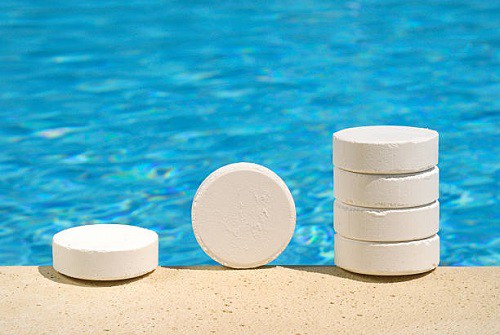
Video tutorial types of chlorine for swimming pools
Next, in this video you will learn everything you need to have a pool in good condition and have clean water.
